Maven
Maven 是一个项目管理工具,可以对 Java 项目进行构建、依赖管理。Maven 也可被用于构建和管理各种项目,例如 C#,Ruby,Scala 和其他语言编写的项目
Maven可以帮助我们做:
- 项目的自动构建,包括代码的编译、测试、打包、安装、部署等操作。
- 依赖管理,项目使用到哪些依赖,可以快速完成导入。
Maven 下载
进入Maven 官网, 按照下图进行操作:
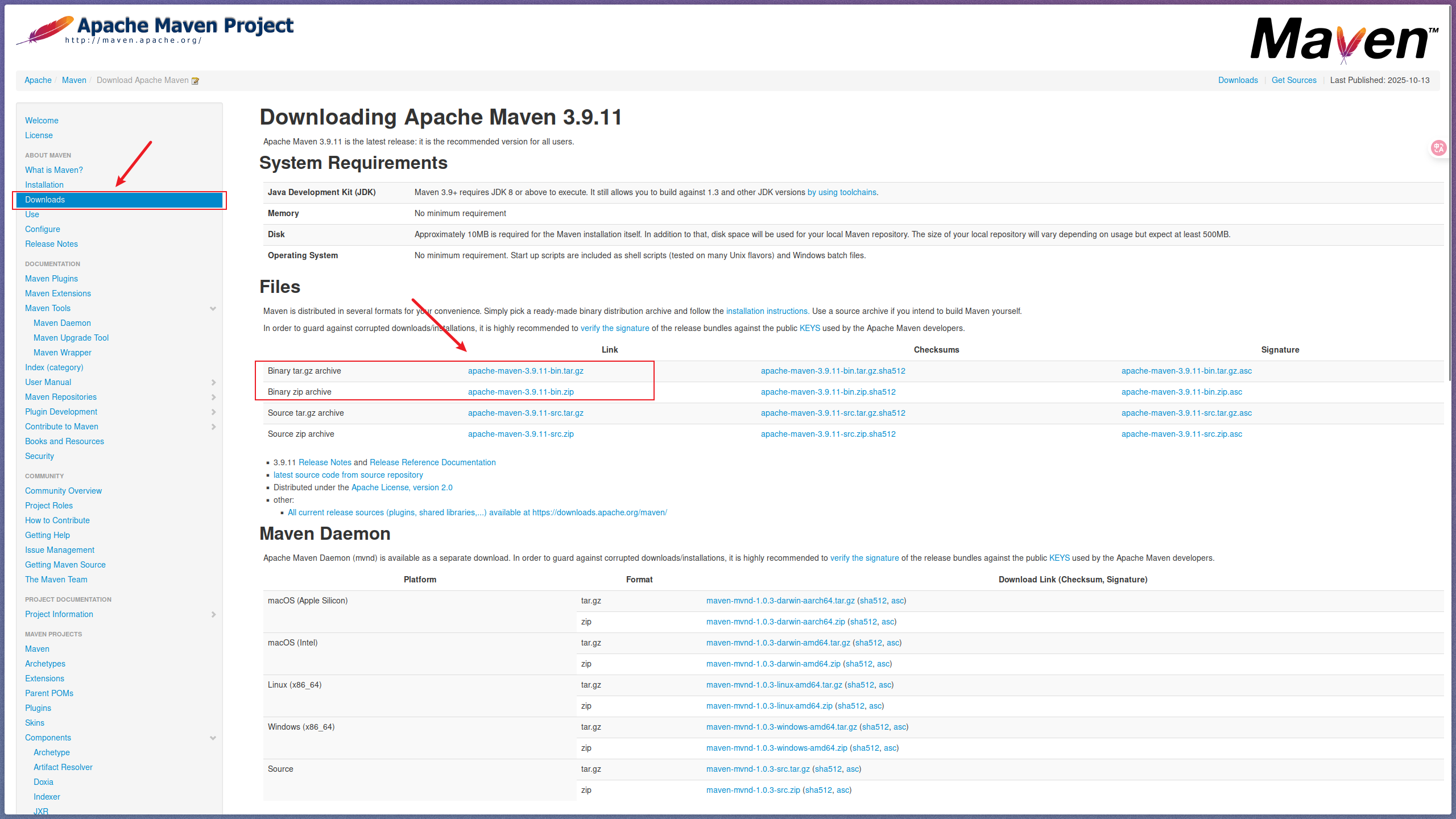
TIP
Windows选择zip格式, Linux选择targz格式
Maven 基本配置
IDEA 中自带 Maven,不需要任何配置及可以使用。如果想要使用本地的 Maven 按照如下步骤进行配置:
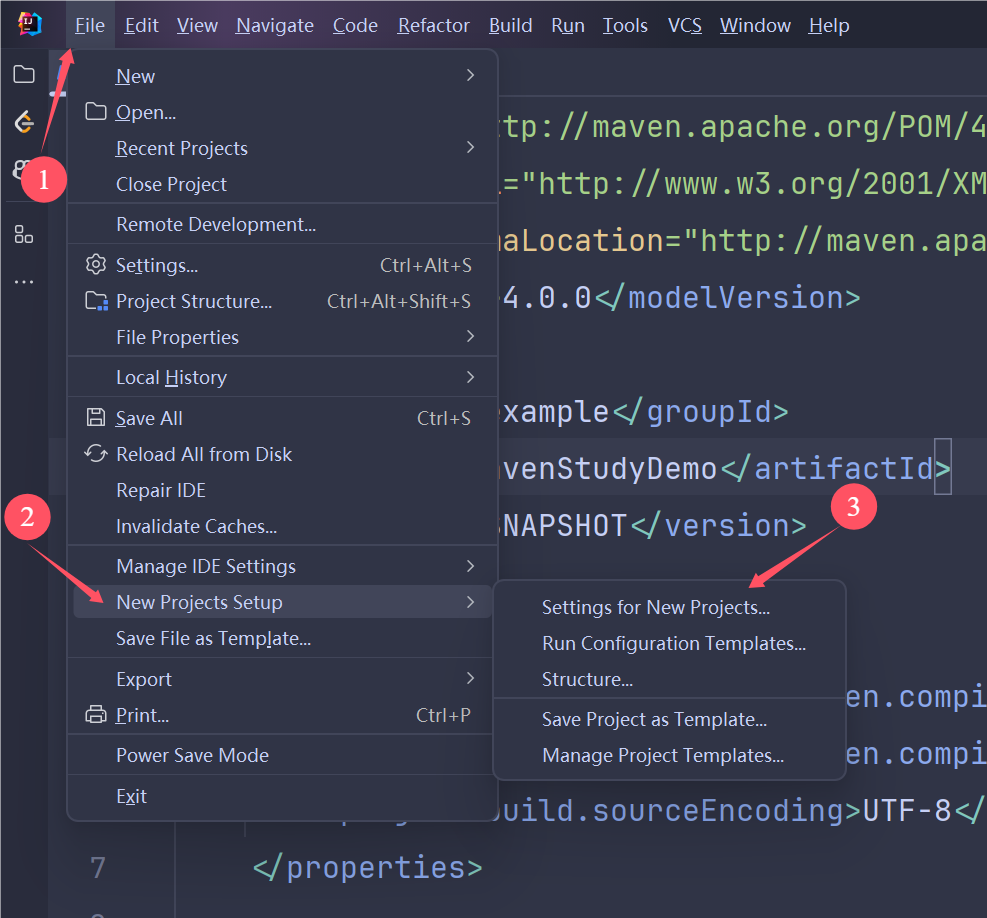
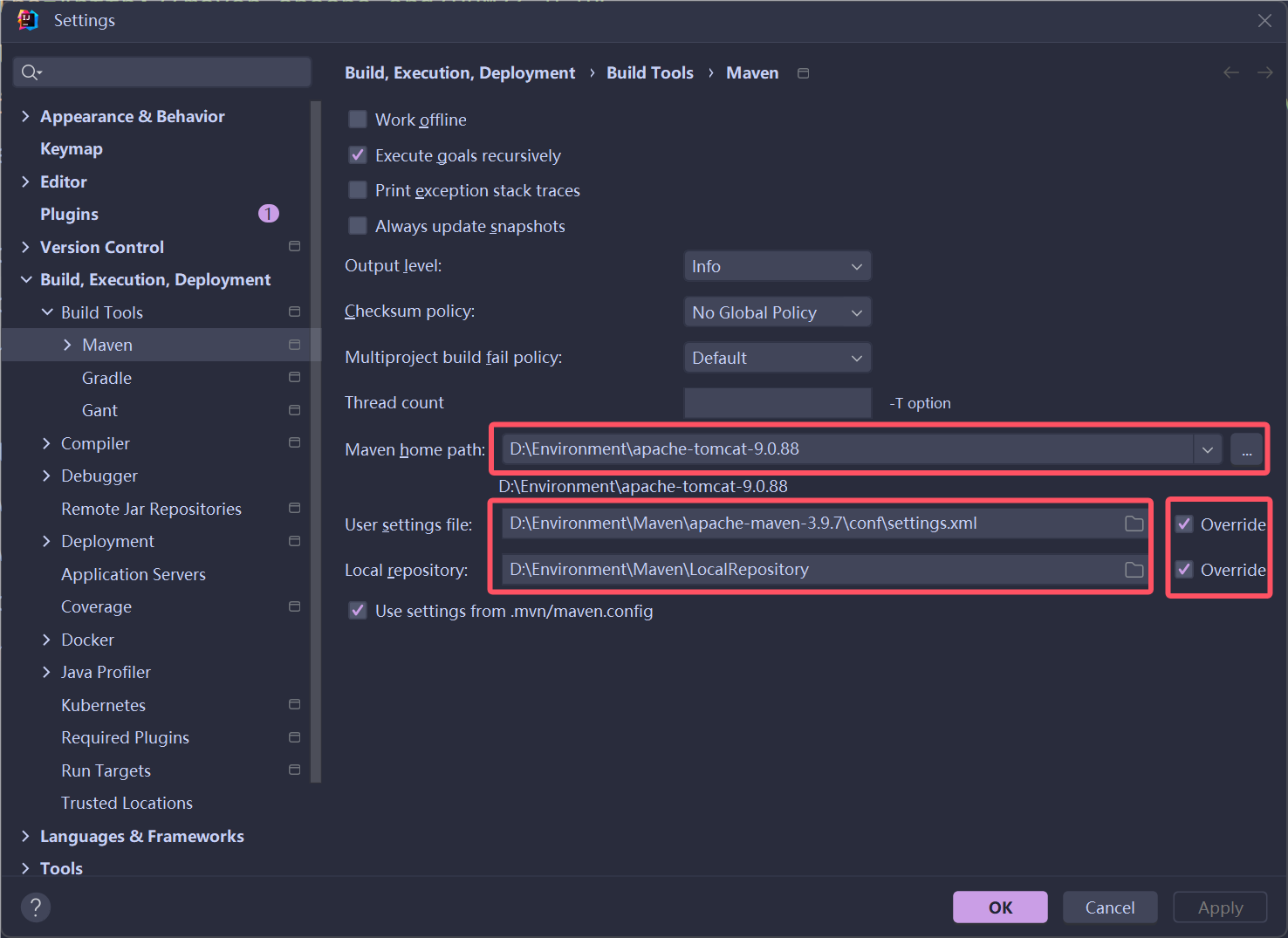
修改完成默认位置后,还需要修改 Maven 默认配置文件settings.xml,指定本地仓库路径,如果不指定仍然会使用默认仓库路径
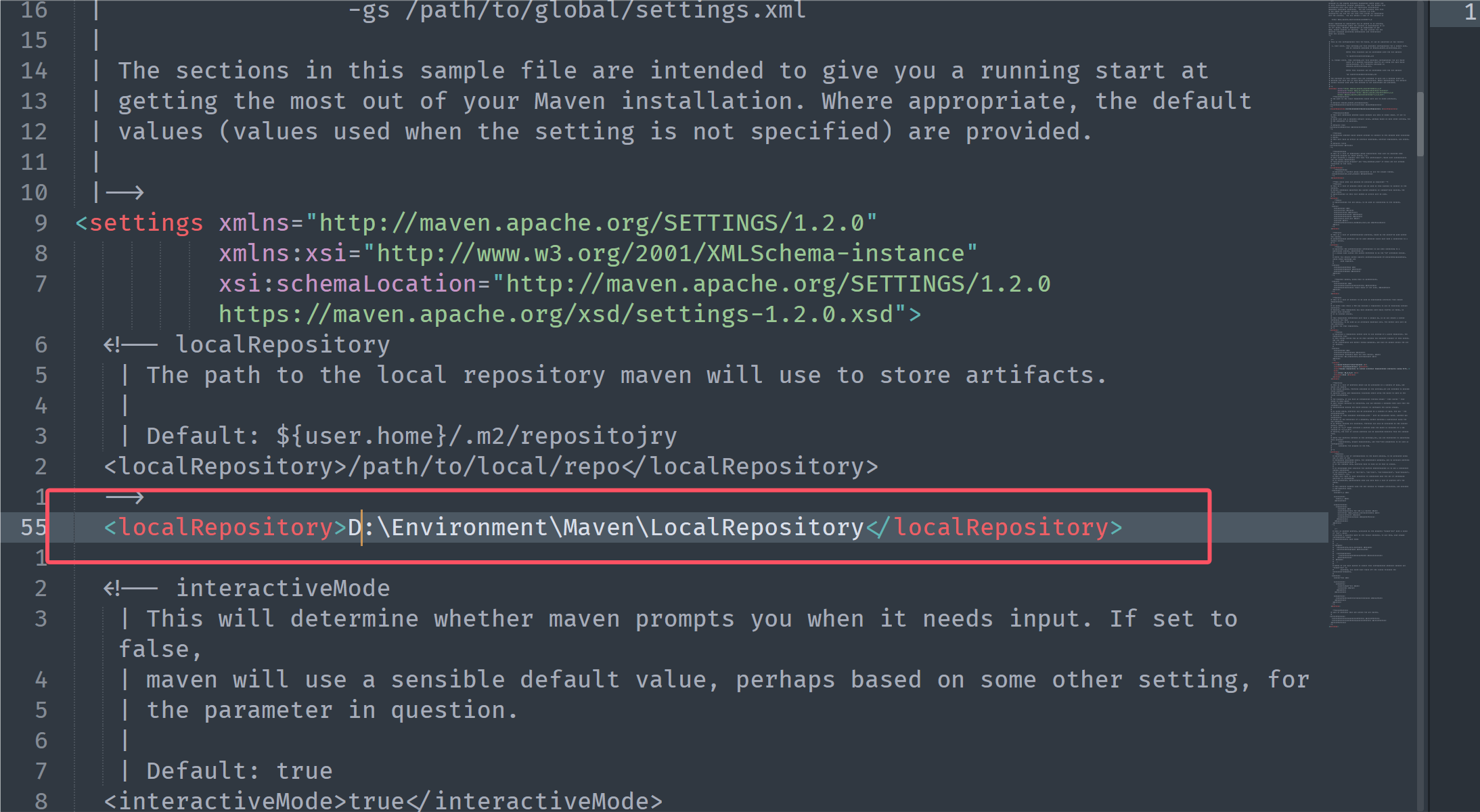
注:setting.xml位于 Maven 安装目录 conf 文件夹下
由于 Maven 中心仓库服务器位于国外,在国内访问速度可能会很缓慢。可以配置仓库镜像加快访问速度(配置仓库镜像后。所需要的依赖会从镜像中寻找,而不是原来的中心仓库)。添加如下的内容到配置文件的mirrors标签中:
<mirror>
<id>alimaven</id>
<mirrorOf>central</mirrorOf>
<!-- 名称可以自定义 -->
<name>aliyun maven</name>
<url>http://maven.aliyun.com/nexus/content/repositories/central/</url>
</mirror>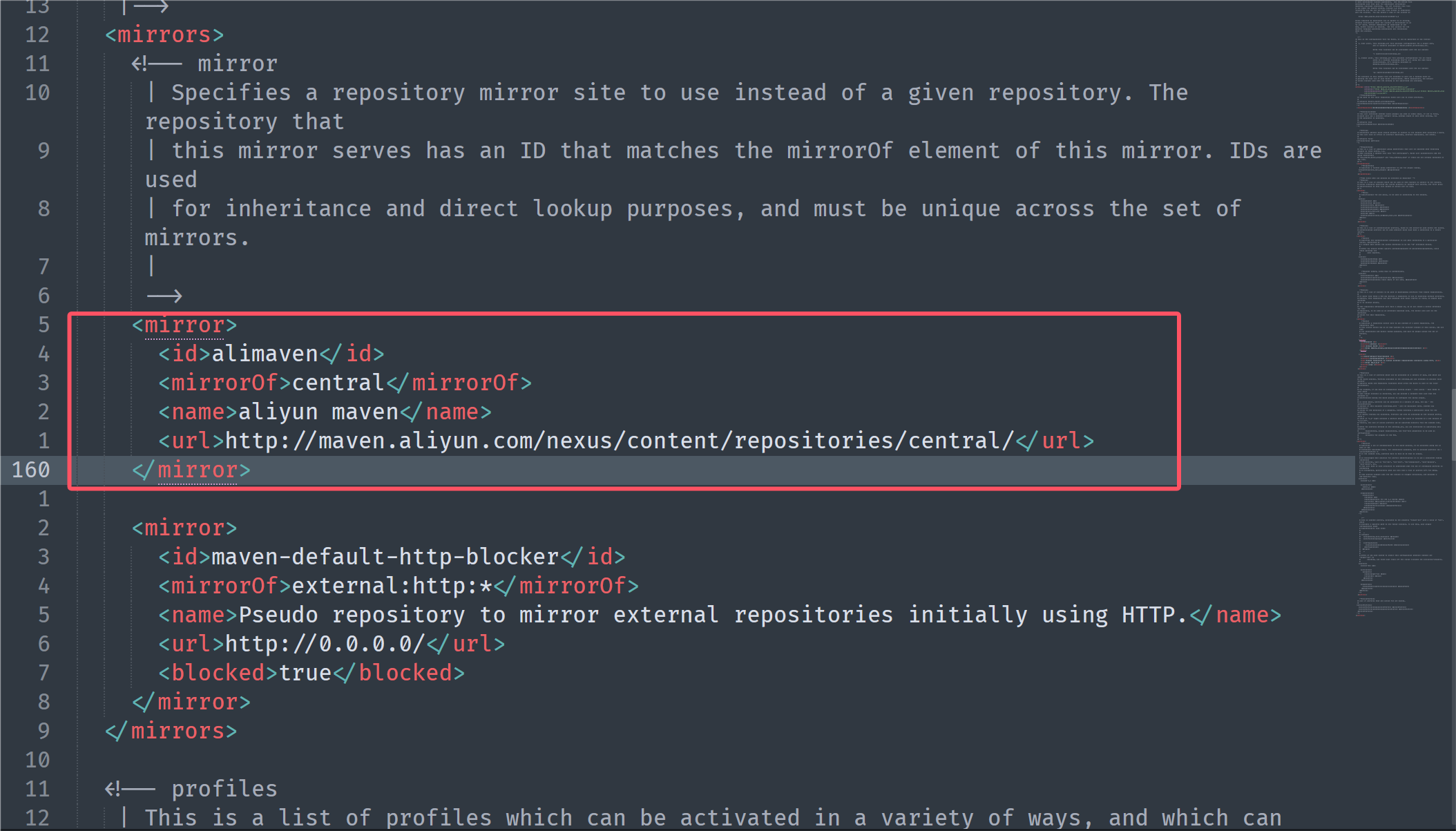
Maven 项目结构
Maven 推荐的标准项目结构如下:
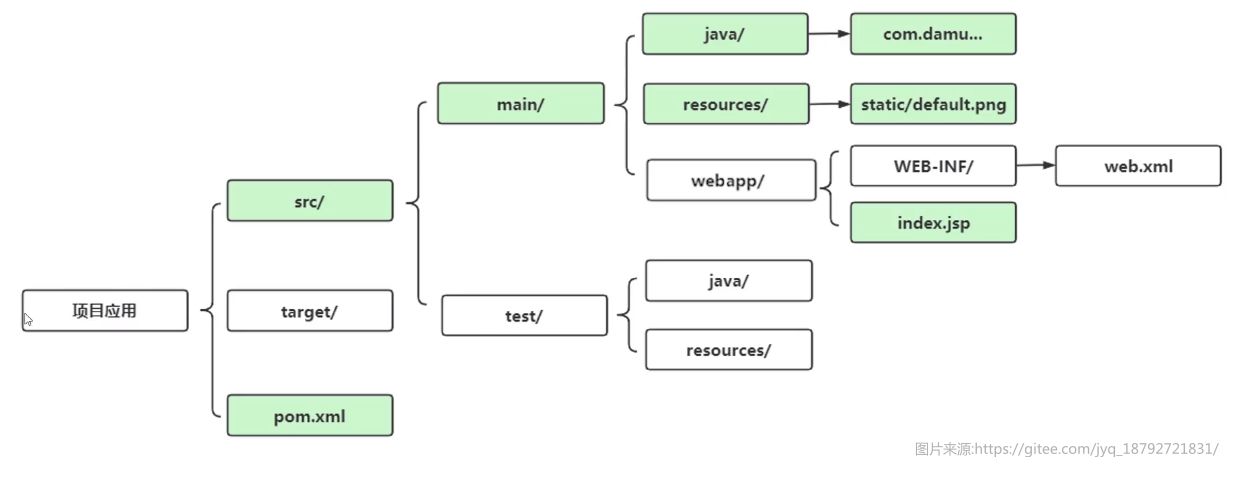
Maven 标签参考
<project xmlns="http://maven.apache.org/POM/4.0.0"
xmlns:xsi="http://www.w3.org/2001/XMLSchema-instance"
xsi:schemaLocation="http://maven.apache.org/POM/4.0.0 http://maven.apache.org/xsd/maven-4.0.0.xsd">
<!-- 项目模型版本 -->
<modelVersion>4.0.0</modelVersion>
<!-- 项目分组ID,通常为公司或组织的域名倒写 -->
<groupId>com.example</groupId>
<!-- 项目唯一标识名 -->
<artifactId>demo-project</artifactId>
<!-- 项目版本号 -->
<version>1.0.0</version>
<!-- 打包类型(jar/war/pom等) -->
<packaging>jar</packaging>
<!-- 项目名称 -->
<name>Demo Project</name>
<!-- 项目描述 -->
<description>这是一个包含所有常用 Maven 标签的示例项目。</description>
<!-- 项目主页 -->
<url>https://example.com/demo-project</url>
<!-- 项目属性,可用于变量替换 -->
<properties>
<maven.compiler.source>1.8</maven.compiler.source>
<maven.compiler.target>1.8</maven.compiler.target>
<project.build.sourceEncoding>UTF-8</project.build.sourceEncoding>
</properties>
<!-- 项目依赖列表 -->
<dependencies>
<dependency>
<groupId>org.slf4j</groupId>
<artifactId>slf4j-api</artifactId>
<version>1.7.30</version>
<!-- 依赖作用域 -->
<scope>compile</scope>
<!-- 可选依赖声明 -->
<optional>false</optional>
<!-- 排除传递依赖 -->
<exclusions>
<exclusion>
<groupId>org.slf4j</groupId>
<artifactId>slf4j-log4j12</artifactId>
</exclusion>
</exclusions>
</dependency>
</dependencies>
<!-- 依赖管理,统一版本控制 -->
<dependencyManagement>
<dependencies>
<dependency>
<groupId>junit</groupId>
<artifactId>junit</artifactId>
<version>4.13.2</version>
<scope>test</scope>
</dependency>
</dependencies>
</dependencyManagement>
<!-- 构建相关配置 -->
<build>
<!-- 源码目录配置 -->
<sourceDirectory>src/main/java</sourceDirectory>
<!-- 资源文件目录配置 -->
<resources>
<resource>
<directory>src/main/resources</directory>
</resource>
</resources>
<!-- 插件配置 -->
<plugins>
<plugin>
<artifactId>maven-compiler-plugin</artifactId>
<version>3.8.1</version>
<configuration>
<source>${maven.compiler.source}</source>
<target>${maven.compiler.target}</target>
</configuration>
</plugin>
</plugins>
</build>
<!-- 项目模块(多模块项目使用) -->
<modules>
<module>module-a</module>
<module>module-b</module>
</modules>
<!-- 父项目配置(用于继承) -->
<parent>
<groupId>com.example.parent</groupId>
<artifactId>parent-project</artifactId>
<version>1.0.0</version>
</parent>
<!-- 项目开发者信息 -->
<developers>
<developer>
<id>dev01</id>
<name>开发者姓名</name>
<email>dev01@example.com</email>
<roles>
<role>开发</role>
</roles>
</developer>
</developers>
<!-- 项目许可证信息 -->
<licenses>
<license>
<name>Apache License 2.0</name>
<url>https://www.apache.org/licenses/LICENSE-2.0</url>
<distribution>repo</distribution>
</license>
</licenses>
<!-- SCM(源码管理)信息 -->
<scm>
<connection>scm:git:git://github.com/example/demo-project.git</connection>
<developerConnection>scm:git:ssh://github.com/example/demo-project.git</developerConnection>
<url>https://github.com/example/demo-project</url>
</scm>
<!-- 项目分发管理(如发布仓库) -->
<distributionManagement>
<repository>
<id>releases</id>
<name>Release Repository</name>
<url>https://repo.example.com/releases</url>
</repository>
<snapshotRepository>
<id>snapshots</id>
<name>Snapshot Repository</name>
<url>https://repo.example.com/snapshots</url>
</snapshotRepository>
</distributionManagement>
<!-- 项目报告配置 -->
<reporting>
<outputDirectory>target/site</outputDirectory>
<plugins>
<plugin>
<groupId>org.apache.maven.plugins</groupId>
<artifactId>maven-project-info-reports-plugin</artifactId>
<version>3.1.2</version>
</plugin>
</plugins>
</reporting>
<!-- 项目仓库配置 -->
<repositories>
<repository>
<id>central</id>
<name>Maven Central</name>
<url>https://repo.maven.apache.org/maven2</url>
</repository>
</repositories>
<!-- 插件仓库配置 -->
<pluginRepositories>
<pluginRepository>
<id>central</id>
<name>Maven Central Plugin Repository</name>
<url>https://repo.maven.apache.org/maven2</url>
</pluginRepository>
</pluginRepositories>
<!-- 项目邮件列表 -->
<mailingLists>
<mailingList>
<name>开发者邮件列表</name>
<archive>https://example.com/mail-archive</archive>
<post>dev@example.com</post>
</mailingList>
</mailingLists>
<!-- 项目组织信息 -->
<organization>
<name>Example Org</name>
<url>https://example.com</url>
</organization>
<!-- 项目依赖的 profile 配置 -->
<profiles>
<profile>
<id>dev</id>
<activation>
<activeByDefault>true</activeByDefault>
</activation>
<properties>
<env>dev</env>
</properties>
</profile>
</profiles>
</project>Maven 依赖搜索
想要查找某个 Maven 依赖, 可以在Maven中心仓库进行搜索, 下面以查找lombok为例子, 讲解怎么操作及:
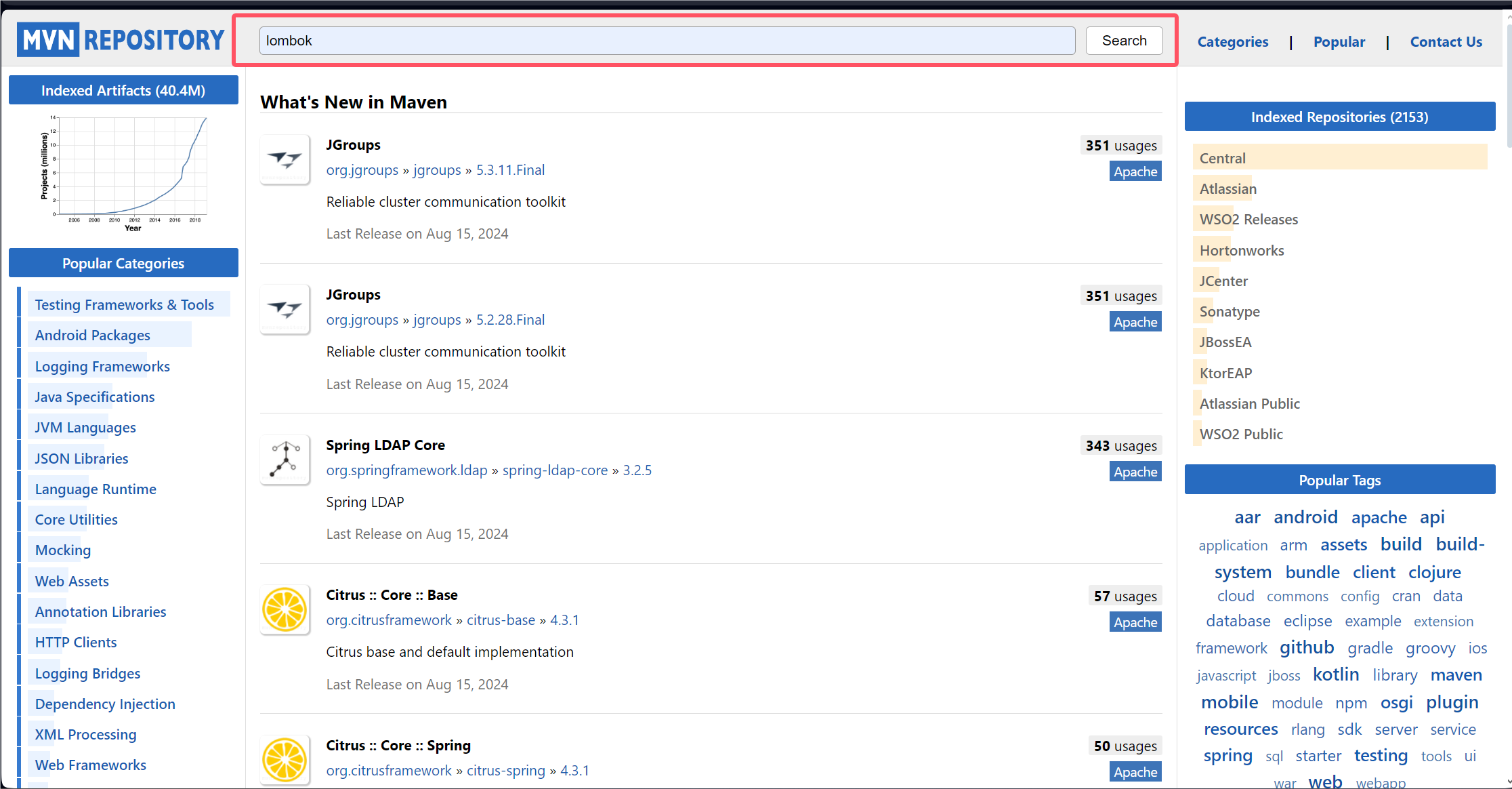
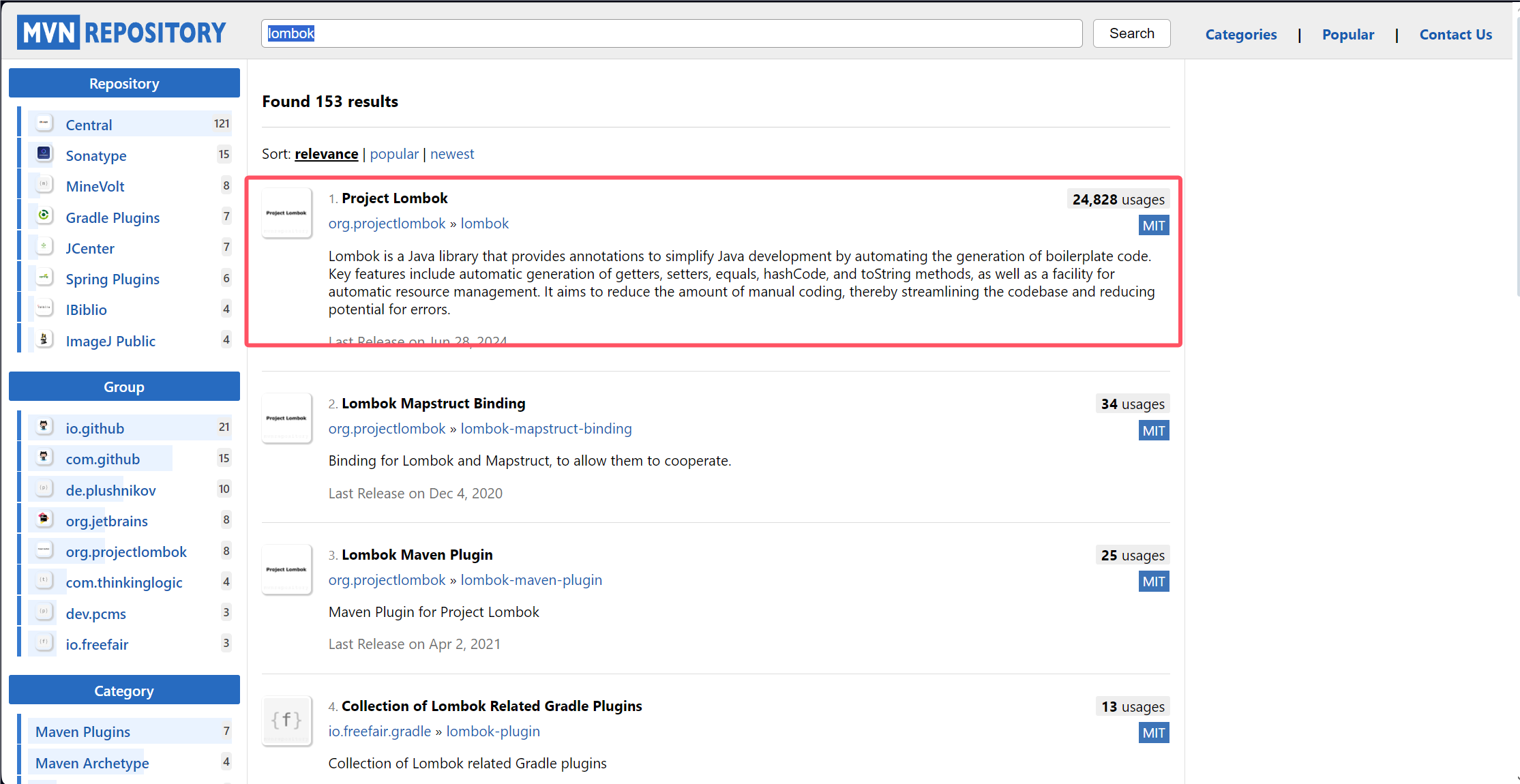
单击所需版本的版本号
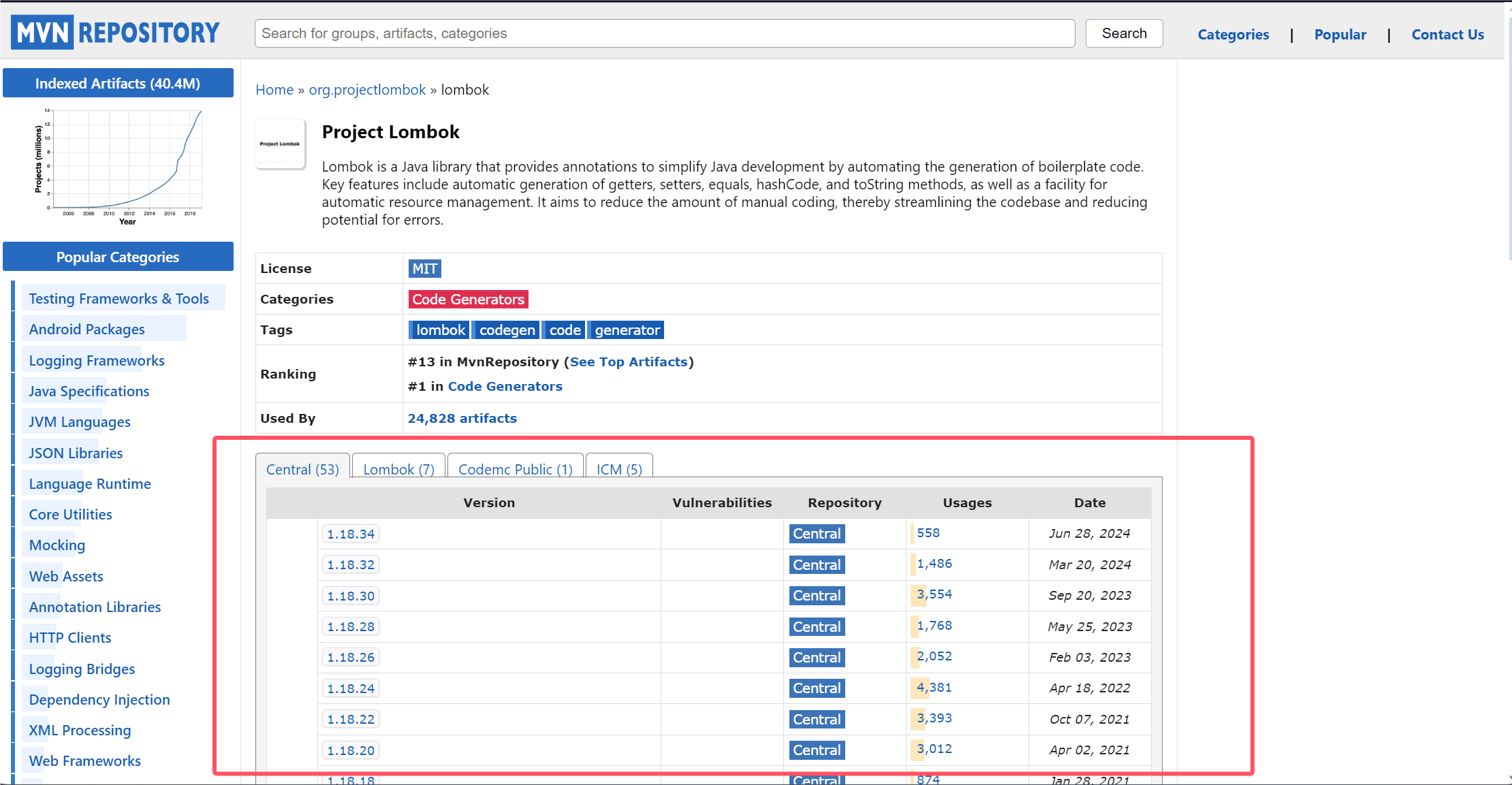
选择 Maven,就可以看到对应的依赖信息
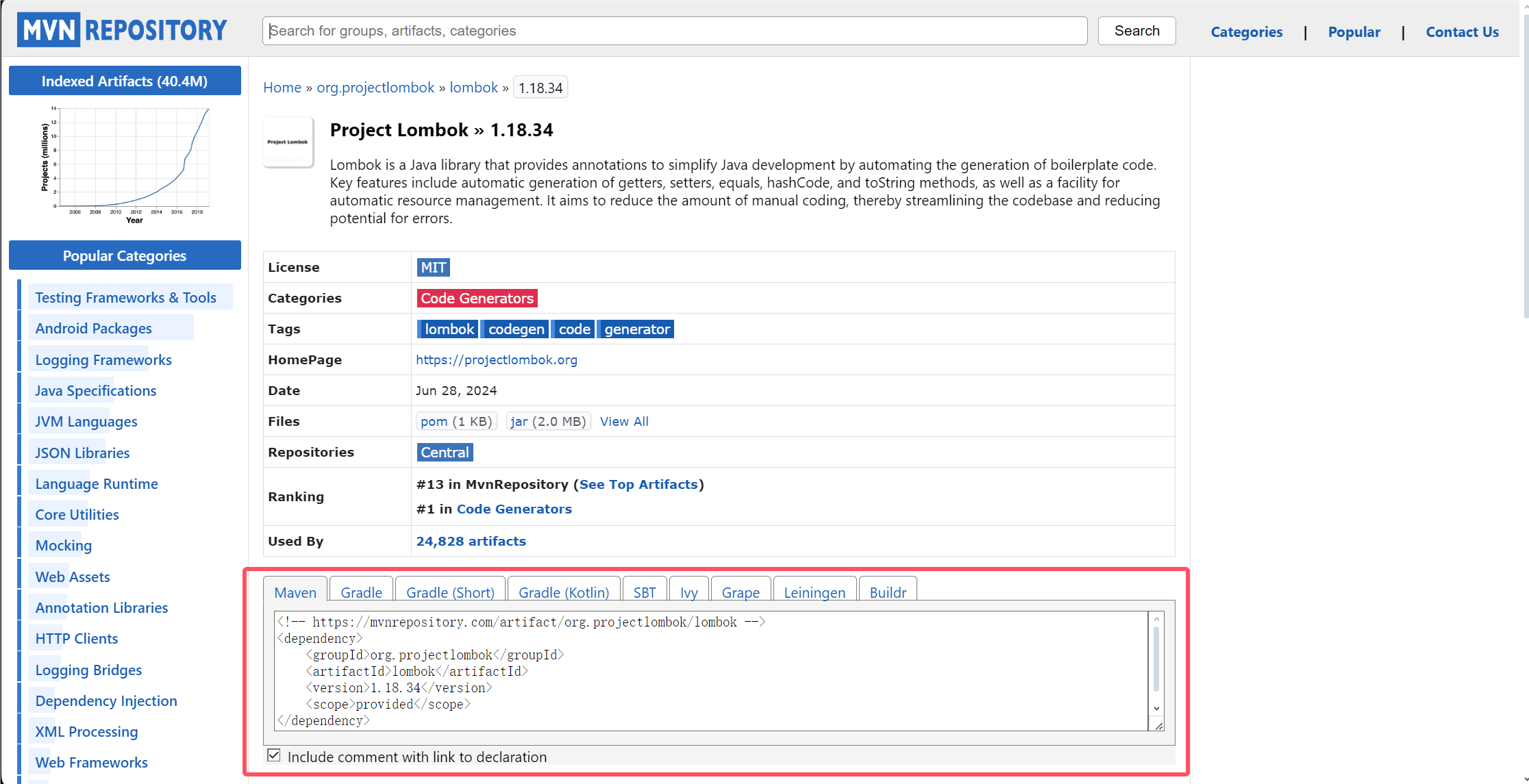
Maven 依赖查找流程
对于pom文件中声明的依赖, Maven会先从本地仓库中尝试查找, 如果依赖不存在, 则会去远程仓库中查找, 如果远程仓库中存在该依赖, 则会缓存到本地仓库中.
TIP
对于Windows系统, Maven本地仓库默认位置为C:/Users/用户名/.m2/
Maven 依赖作用域
Maven 中使用 scope 属性来指定依赖的作用域范围:
| 作用域 | 编译 | 测试 | 运行 | 打包 | 传递性 |
|---|---|---|---|---|---|
| compile | √ | √ | √ | √ | √ |
| provided | √ | √ | × | × | × |
| runtime | × | √ | √ | √ | √ |
| test | × | √ | × | × | × |
| system | √ | √ | × | × | × |
TIP
- 如果没有显示指定
scope,则默认作用域为compile - system 的作用域和 provided 一样,但是它不是从远程仓库获取,而是直接导入本地 Jar 包
- 传递性表示当前项目的依赖是否会被子项目继承
- compile :依赖在编译、运行、测试、打包时均有效。
- provided :依赖在编译、测试时有效,但是在运行时无效,也就是说,项目在运行时,不需要此依赖,比如我们上面的 Lombok,我们只需要在编译阶段使用它,编译完成后,实际上已经转换为对应的代码了,因此 Lombok 不需要在项目运行时也存在。
- runtime :依赖在在运行、测试、打包时有效,编译代码时无效. 例如 JDBC 驱动,我们在编译代码时仅依赖JDBC相关接口(JDK标准库已提供), 并不需要 JDBC 驱动(JDBC具体实现),只有在运行时才需要(运行时依赖于具体的实现),因此 JDBC 驱动的作用域可以设置为 runtime.
- test :依赖只在测试时有效,例:JUnit,我们一般只会在测试阶段使用 JUnit,而实际项目运行时,我们并不需要 JUnit,因此我们可以将 JUnit 的作用域设置为 test.
- system:作用域和 provided 是一样的,但是它不是从远程仓库获取,而是直接导入本地 Jar 包
<dependency>
<!-- 作用域为system时,groupId、artifactId、version可以自定义,但建议按照对应jar信息填写 -->
<groupId>javax.jntm</groupId>
<artifactId>lbwnb</artifactId>
<version>2.0</version>
<!-- scope为system时, 需要使用systemPath标签来指定jar文件的位置 -->
<scope>system</scope>
<!-- 只有作用域为system该标签才生效 -->
<systemPath>C:/test/A/test.jar</systemPath>
</dependency>Maven 可选依赖
optional标签声明单个依赖为可选依赖. 当项目被继承时, 可选依赖不会被传递到子项目中
<dependency>
<!-- 依赖不会传递到子项目中-->
<groupId>org.slf4j</groupId>
<artifactId>slf4j-api</artifactId>
<version>1.7.30</version>
<optional>true</optional>
</dependency>TIP
当依赖具有传递性时(作用域声明为compile或runtime), 这个标签才会生效
Maven 排除依赖
一个Maven依赖通常还包含多个其他的Maven依赖, 如果想要排除一些不需要的依赖, 可以使用exclusion标签
<dependency>
<groupId>org.junit.jupiter</groupId>
<artifactId>junit-jupiter</artifactId>
<version>5.8.1</version>
<scope>test</scope>
<exclusions>
<!-- exclusion需要和exclusions标签一起使用 -->
<!-- 排除junit-jupiter中的junit-jupiter-engine依赖 -->
<exclusion>
<groupId>org.junit.jupiter</groupId>
<artifactId>junit-jupiter-engine</artifactId>
</exclusion>
</exclusions>
</dependency>Maven 继承关系
Maven 支持多模块项目开发,多个模块可以组成一个完整的项目。每个模块可以单独编译、测试、打包、安装、部署等操作,也可以将多个模块组合成一个整体进行操作。多模块项目中有一个父项目,多个子项目,子项目可以继承父项目的配置。
子项目能够从父项目中继承以下内容:
- 父项目的依赖(
dependencies标签中未放入dependencyManagement的依赖) - 插件配置(
build/plugins) - 属性(
properties) - 资源文件(
build/resources) - 编译器版本等构建相关配置
- 仓库配置(
repositories、pluginRepositories) - 统一的版本号、分组ID(
groupId、version) - 继承的父项目的
distributionManagement、reporting等配置 - 其他在父POM中声明且支持继承的配置项
父项目的pom.xml文件:
<?xml version="1.0" encoding="UTF-8"?>
<project xmlns="http://maven.apache.org/POM/4.0.0"
xmlns:xsi="http://www.w3.org/2001/XMLSchema-instance"
xsi:schemaLocation="http://maven.apache.org/POM/4.0.0 http://maven.apache.org/xsd/maven-4.0.0.xsd">
<groupId>org.example</groupId>
<artifactId>ParentModel</artifactId>
<version>1.0-SNAPSHOT</version>
<!-- Maven项目采用多模块时, 父模块打包方式必须声明为pom, 并在module标签中指定子模块名 -->
<packaging>pom</packaging>
<modelVersion>4.0.0</modelVersion>
<modules>
<module>ChildModel</module>
</modules>
<properties>
<maven.compiler.source>8</maven.compiler.source>
<maven.compiler.target>8</maven.compiler.target>
</properties>
<dependencies>
<dependency>
<groupId>junit</groupId>
<artifactId>junit</artifactId>
<version>4.13.2</version>
<scope>test</scope>
</dependency>
</dependencies>
</project>子项目的pom.xml文件:
<?xml version="1.0" encoding="UTF-8"?>
<project xmlns="http://maven.apache.org/POM/4.0.0"
xmlns:xsi="http://www.w3.org/2001/XMLSchema-instance"
xsi:schemaLocation="http://maven.apache.org/POM/4.0.0 http://maven.apache.org/xsd/maven-4.0.0.xsd">
<!-- 指定模块-->
<parent>
<groupId>org.example</groupId>
<artifactId>Parent</artifactId>
<version>1.0-SNAPSHOT</version>
</parent>
<modelVersion>4.0.0</modelVersion>
<artifactId>ChildModel</artifactId>
<!-- 子项目可以添加自己的依赖和配置 -->
<dependencies>
<!-- 继承父项目依赖的同时,也可以添加子项目特有的依赖 -->
<dependency>
<groupId>org.slf4j</groupId>
<artifactId>slf4j-api</artifactId>
<version>1.7.30</version>
</dependency>
</dependencies>
</project>Maven 常用命令
| 命令 | 说明 |
|---|---|
| clean | 清理整个 target 文件夹,常用于解决 Spring Boot 项目缓存未更新的问题。 |
| validate | 验证项目的可用性。 |
| compile | 将项目编译为 .class 文件。 |
| package | 根据项目配置打包生成可分发的文件(如 .jar 或 .war)。 |
| install | 将当前项目安装到本地仓库,供其他项目作为依赖导入使用。 |
| verify | 按顺序执行每个默认生命周期阶段(如 validate、compile、package 等)。 |
使用示例:
# 清理项目生成的 target 目录
mvn clean
# 验证项目结构和配置是否正确
mvn validate
# 编译项目源码,生成 class 文件
mvn compile
# 打包项目,生成 jar 或 war 文件
# 这个命令生成的Jar包类型是依赖Jar, 不包含项目需要的依赖
mvn package
# 安装项目到本地仓库,供其他项目依赖
mvn install
# 执行所有生命周期阶段,确保项目完整性
mvn verifyMaven 插件
生成可执行 Jar 包
Maven 打包命令mvn package生成的 Jar 包是依赖 Jar,不包含项目需要的依赖. 如果想要生成包含依赖的可执行 Jar 包, 需要使用Maven Assembly Plugin插件.
TIP
可执行 Jar 包含项目需要的所有依赖, 可以直接使用java -jar xxx.jar命令运行
<plugin>
<!-- 不显示指定groupId, 使用默认的plugin groupId: org.apache.maven.plugins -->
<artifactId>maven-assembly-plugin</artifactId>
<version>[last-version]</version>
<!-- 插件配置 -->
<configuration>
<!-- 指定生成jar命名后缀描述符 -->
<descriptorRefs>
<!-- 生成的可执行jar名称: xxxx-jar-with-dependencies.jar -->
<descriptorRef>jar-with-dependencies</descriptorRef>
</descriptorRefs>
<archive>
<manifest>
<!-- 在清单文件中添加类路径信息,方便依赖查找 -->
<addClasspath>true</addClasspath>
<!-- 指定程序入口类(main 方法所在类) -->
<mainClass>com.test.Main</mainClass>
</manifest>
</archive>
</configuration>
<!-- 指定Maven执行时, 插件执行的goal -->
<executions>
<execution>
<id>make-assembly</id>
<!-- 将插件提供的single命令绑定到package生命周期 -->
<!-- 执行package时, 会执行插件的single命令 -->
<phase>package</phase>
<goals>
<goal>single</goal>
</goals>
</execution>
</executions>
</plugin>插件命令已经绑定到package, 直接执行package命令会自动执行插件命令:
mvn clean package
第一个 Jar 包是依赖 Jar, 第二个 Jar 包是包含依赖的可执行 Jar 包
